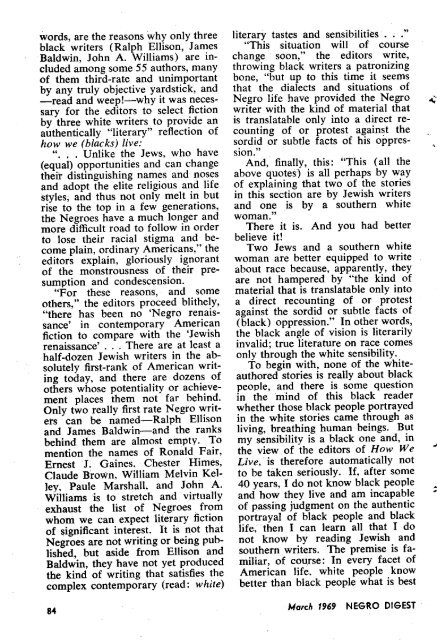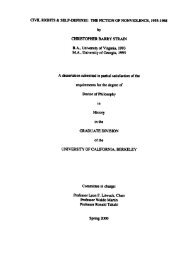Negro Digest - Freedom Archives
Negro Digest - Freedom Archives
Negro Digest - Freedom Archives
You also want an ePaper? Increase the reach of your titles
YUMPU automatically turns print PDFs into web optimized ePapers that Google loves.
words, are the reasons why only three<br />
black writers (Ralph Ellison, James<br />
Baldwin, John A . Williams) are included<br />
among some 55 authors, many<br />
of them third-rate and unimportant<br />
by any truly objective yardstick, and<br />
-read and weep!-why it was necessary<br />
for the editors to select fiction<br />
by three white writers to provide an<br />
authentically "literary" reflection of<br />
how we (blacks) live :<br />
" . . Unlike the Jews, who have<br />
(equal) opportunities and can change<br />
their distinguishing names and noses<br />
and adopt the elite religious and life<br />
styles; and thus not only melt in but<br />
rise to the top in a few generations,<br />
the <strong>Negro</strong>es have a much longer and<br />
more difficult road to follow in order<br />
to lose their racial stigma and become<br />
plain, ordinary Americans," the<br />
editors explain, gloriously ignorant<br />
of the monstrousness of their presumption<br />
and condescension .<br />
"For these reasons, and some<br />
others," the editors proceed blithely,<br />
"there has been no `<strong>Negro</strong> renaissance'<br />
in contemporary American<br />
fiction to compare with the `Jewish<br />
renaissance' . . . There are at least a<br />
half-dozen Jewish writers in the absolutely<br />
first-rank of American writing<br />
today, and there are dozens of<br />
others whose potentiality or achievement<br />
places them not far behind .<br />
Only two really first rate <strong>Negro</strong> writers<br />
' can be named-Ralph Ellison<br />
and James Baldwin-and the ranks<br />
behind them are almost empty . To<br />
mention the names of Ronald Fair,<br />
Ernest J : Games : Chester Himes,<br />
Claude Brown, William Melvin Kelley,<br />
Paule Marshall, and John A.<br />
Williams is to stretch and virtually<br />
exhaust the list of <strong>Negro</strong>es from<br />
whom we can expect literary fiction<br />
of significant interest. It is not that<br />
<strong>Negro</strong>es are not writing or being published,<br />
but aside from Ellison and<br />
Baldwin, they have not yet produced<br />
the kind of writing that satisfies the<br />
complex contemporary (read : white)<br />
84<br />
literary tastes and sensibilities . : .<br />
"This situation will of course<br />
change soon," the editors write,<br />
throwing black writers a patronizing<br />
bone, "but up to this time it seems<br />
that the dialects and situations of<br />
<strong>Negro</strong> life have provided the <strong>Negro</strong><br />
writer with the kind of material that<br />
is translatable only into a direct recounting<br />
of or protest against the<br />
sordid or subtle facts of his oppression<br />
."<br />
And, finally, this : "This (all the<br />
above quotes) is all perhaps by way<br />
of explaining that two of the stories<br />
in this section are by Jewish writers<br />
and one is by a southern white<br />
woman ."<br />
There it is . And you had better<br />
believe it!<br />
Two Jews and a southern white<br />
woman are better equipped to write<br />
about race because, apparently, they<br />
are not hampered by "the kind of<br />
material that is translatable only into<br />
a direct recounting of or protest<br />
against the sordid or subtle facts of<br />
(black) oppression ." In other words,<br />
the black angle of vision is literarily<br />
invalid ; true literature on race comes<br />
only through the white sensibility .<br />
To begin with, none of the whiteauthored<br />
stories is really about black<br />
people, and there is some question<br />
in the mind of this black reader<br />
whether those black people portrayed<br />
in the white stories came through as<br />
living, breathing human beings . But<br />
my sensibility is a black one and, in<br />
the view of the editors of How We<br />
Live, is therefore automatically not<br />
to be taken seriously . If, after some<br />
40 years, I do not know black people<br />
and how they live and am incapable<br />
of passing judgment on the authentic<br />
portrayal of black people and black<br />
life; then I can learn all that I do<br />
not know by reading Jewish and<br />
southern writers . The premise is familiar,<br />
of course : In every facet of<br />
American life, white people know<br />
better than black people what is best<br />
March 1969 NEGRO DIGEST
















